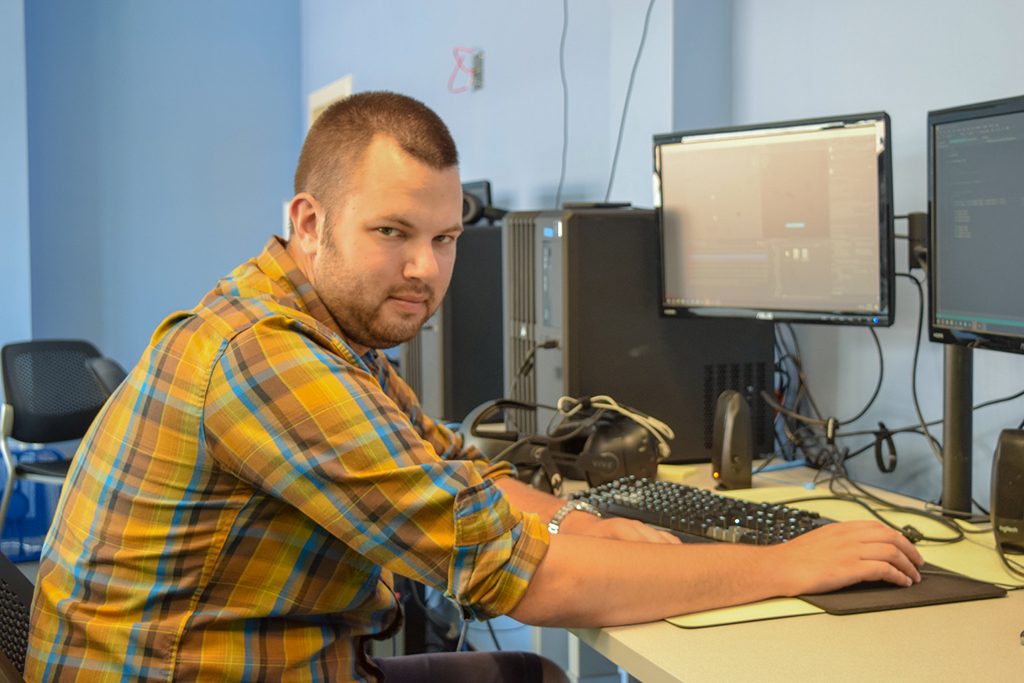Camden Bock: STEM Education grad student bringing VR to classrooms across Maine

As a research assistant with University of Maine’s Immersive Mathematics in Rendered Environments (IMRE) lab, Camden Bock helps develop virtual reality software for teaching math to kids. As a Ph.D. student in STEM Education, he’s researching how these new tools are used in in PreK-12 schools across Maine.
Last school year and the year before, Bock received funding from the College of Education and Human Development’s Linda N. Lancaster Professional Development Fund in order to attend academic conferences in France and Indianapolis. The Lancaster Fund is available to doctoral students in the College of Education to support and enhance their research, professional contacts and experience. The fund was created in memory of Linda Lancaster, a promising doctoral student in counselor education, killed by a drunk driver in 1989.
In this Q&A, Bock talks about his work with the IMRE lab and how the Lancaster Fund helped his scholarly and professional growth.
Hometown:
New Boston, New Hampshire.
Hobbies/interests/activities:
Hiking with my dog, Wix, a yellow lab.
What is your undergraduate degree in and where did you earn it?
I went to Bates College, where I earned a B.S. in mathematics, with a minor in teacher education [secondary mathematics certification].
What graduate degree are you pursuing at UMaine and when do you expect to graduate?
I’m working on a Ph.D. in STEM education with a concentration in mathematics. Right now, I’m doing the Master of Science in Teaching program through the RiSE Center, which is the track for students who enter the STEM Education Ph.D. without a master’s degree. I should finish the MST program in December 2018. I’m not sure when I will finish the doctoral program.
What have you done with the money received from the Lancaster Fund?
I have used awards from the Lancaster Fund to travel to present co-authored brief research reports at the 13th International Conference on Technology in Mathematics Teaching in Lyon, France in July 2017 and the 39th annual meeting of the International Group for the Psychology of Mathematics Education-North American Chapter in Indianapolis, Indiana in October 2017.
How has the fund supported and enhanced your research, professional contacts and experiences as a doctoral student?
The Lancaster Fund has helped me to develop a professional network with other leading researchers in the field in both domestic and international contexts. This has helped to broaden my reading in the literature and to refine my conceptual frameworks and research designs. The connections made at these conferences have continued to support my growth as a researcher, including connecting with the Autumn School on Digital Tools and Mathematical Modeling in Mathematics Education hosted by Didactics of Mathematics in Wurzburg, Germany.
Describe the Immersive Mathematics in Rendered Environments lab and your work with it.
At the IMRE lab we develop spatial environments for the exploration of mathematical and astronomical ideas. Our current research focuses on immersive spatial displays, emerging display technology where the student is fully immersed in an interactive, three-dimensional virtual space. Within the lab, I lead the software development of HandWaver (geometry education) and Geometer’s Planetarium (astronomy/geometry) and research how pre-service elementary teachers use the software to make mathematical meaning of solid and plane figures.
Why did you choose UMaine and what do you like about the school/area?
I chose University of Maine for graduate study in mathematics education for the opportunity to collaborate with schools across the state. In the IMRE lab we have brought our equipment and software to schools from across the state, getting valuable feedback from students and teachers, which helps to ground our research in the community. The RiSE Center has also provided exciting opportunities to work with local in-service teachers in intensive summer professional development.
Have you had any mentors or advisors during your time at UMaine who have helped you grow academically and/or personally?
My advisor, Justin Dimmel, assistant professor of mathematics education and instructional technology, has been essential for my growth as a researcher, investing in collaborative and ambitious projects while maintaining high standards for both quality of research and authentic treatment of mathematical concepts.
